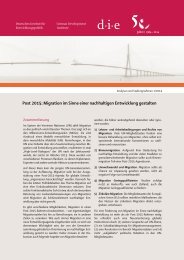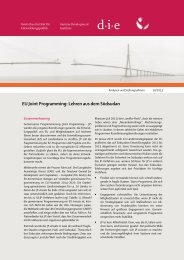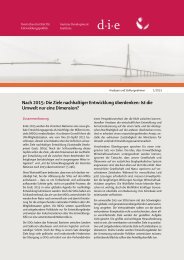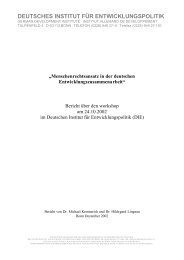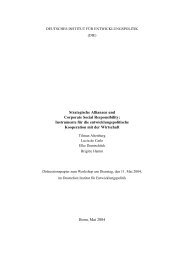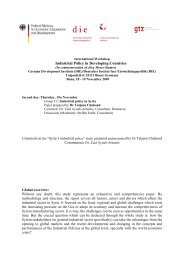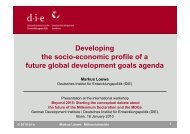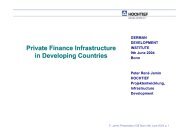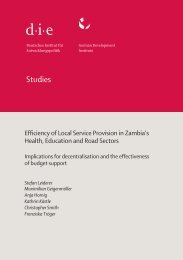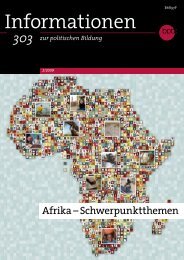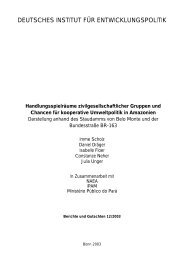Middle East / North Africa and the Millennium Development Goals ...
Middle East / North Africa and the Millennium Development Goals ...
Middle East / North Africa and the Millennium Development Goals ...
Create successful ePaper yourself
Turn your PDF publications into a flip-book with our unique Google optimized e-Paper software.
110<br />
Markus Loewe<br />
Additional indications are presented in <strong>the</strong> national MDG reports. According<br />
to <strong>the</strong> guidelines drawn by <strong>the</strong> United Nations <strong>Development</strong> Group<br />
(UNDG 2003) every national MDG report should assess <strong>the</strong> quality of <strong>the</strong><br />
so-called “supportive environment” for <strong>the</strong> implementation of every single<br />
MDG in <strong>the</strong> respective country. What this means is <strong>the</strong> level of motivation<br />
<strong>and</strong> commitment of <strong>the</strong> relevant actors (i.e. <strong>the</strong> government, but also civil<br />
society) to implementing <strong>the</strong> MDGs. The only reports that contain no such<br />
assessment are <strong>the</strong> Algerian <strong>and</strong> Tunisian ones.<br />
The assessments of <strong>the</strong> o<strong>the</strong>r MDG reports differ substantially. The supportive<br />
environment in Egypt, Bahrain, Morocco, Saudi Arabia, <strong>and</strong> Syria<br />
has in general been assessed ra<strong>the</strong>r positive, while <strong>the</strong> assessments for<br />
Mauritania, Iran, Yemen, Lebanon, <strong>and</strong> <strong>the</strong> Palestinian Territories have<br />
been more negative (see Table A13, Annex).<br />
These divergences can in part be explained. The MDG reports with a more<br />
or less critical tenor have as a rule been prepared by UNDP or ano<strong>the</strong>r<br />
neutral institution. The reports presented by Morocco, Syria, Bahrain, <strong>and</strong><br />
Egypt, however, have been prepared by <strong>the</strong> respective national government<br />
or by a quasi-governmental research institutions. The rulers of <strong>the</strong>se<br />
countries are of course interested (for reasons of internal <strong>and</strong> external legitimacy)<br />
in seeing <strong>the</strong> MDG reports present <strong>the</strong>ir commitment to implementing<br />
<strong>the</strong> MDGs in a positive light.<br />
However, it is difficult, on intuitive grounds, to accept <strong>the</strong> fact that Saudi<br />
Arabia, whose MDG report was released by UNDP, should have received<br />
a better assessment than any o<strong>the</strong>r MENA country, especially in view of<br />
<strong>the</strong> fact that <strong>the</strong> kingdom has shown substantial deficits in implementing<br />
several of <strong>the</strong> MDGs.<br />
There are also contradictions between <strong>the</strong> assessments of various observers<br />
of developments in <strong>the</strong> MENA countries. Some praise in particular <strong>the</strong><br />
commitment of <strong>the</strong> governments of Syria, Tunisia, Egypt, <strong>and</strong> Morocco to<br />
<strong>the</strong> MDGs while o<strong>the</strong>rs note that all statements made by politicians of<br />
<strong>the</strong>se countries are nothing more than lip service.<br />
4.3 Influence of <strong>the</strong> MDG agenda on national policy<br />
It is also not yet possible to say definitively to what extent <strong>the</strong> MDG agenda<br />
has led to policy changes in <strong>the</strong> MENA countries. It is true that <strong>the</strong>y are<br />
German <strong>Development</strong> Institute



